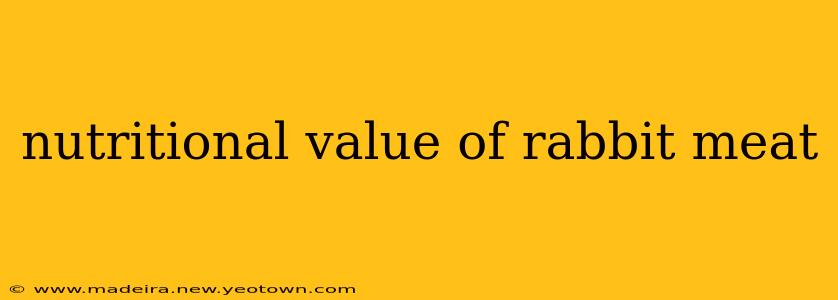The Nutritional Powerhouse: Unveiling the Nutritional Value of Rabbit Meat
Rabbit meat has quietly emerged as a culinary darling and a nutritional powerhouse, offering a lean, delicious alternative to more common proteins. For centuries, it's been a staple in many cultures, but its popularity is now expanding globally as people seek healthier and more sustainable food options. Let's delve into the remarkable nutritional profile of this often-underappreciated meat.
The story of rabbit meat begins with its remarkably low-fat content. Unlike some red meats, rabbit is surprisingly lean, making it a great choice for those watching their cholesterol levels or aiming for a heart-healthy diet. But lean doesn't mean lacking in flavor or nutritional punch. In fact, it's packed with essential nutrients that support overall well-being.
What are the key nutrients in rabbit meat?
Rabbit meat boasts a wealth of vitamins and minerals. It's a good source of high-quality protein, essential for building and repairing tissues. This protein is easily digestible, making it a suitable option for people with sensitive stomachs. Moreover, it's rich in:
- Vitamin B12: Crucial for nerve function, red blood cell formation, and DNA synthesis. Rabbit is an excellent source.
- Niacin (Vitamin B3): Vital for energy metabolism and maintaining healthy skin.
- Riboflavin (Vitamin B2): Important for cell function and energy production.
- Iron: Essential for carrying oxygen throughout the body and preventing anemia.
- Selenium: A powerful antioxidant that protects cells from damage.
- Phosphorus: Important for bone health and energy production.
- Potassium: Helps regulate blood pressure and fluid balance.
- Zinc: Plays a role in immune function and wound healing.
Is rabbit meat a good source of protein?
Absolutely! Rabbit meat is an excellent source of complete protein, meaning it contains all nine essential amino acids our bodies need but can't produce on their own. This makes it a highly valuable protein source for muscle growth, repair, and overall bodily functions. Compared to chicken or turkey, rabbit often contains slightly more protein per serving.
How does rabbit meat compare to other meats nutritionally?
Compared to beef, pork, or even chicken, rabbit meat consistently shines in its low-fat profile and high protein content. It's significantly lower in saturated fat and cholesterol, making it a healthier choice for individuals concerned about heart health. While the exact nutritional content can vary based on the rabbit's diet and breed, it consistently outperforms many other meats in its leanness and nutrient density.
What are the health benefits of eating rabbit meat?
The nutritional profile of rabbit meat translates into several potential health benefits:
- Weight management: Its low fat and high protein content contribute to satiety, potentially aiding in weight loss or maintenance.
- Improved heart health: Lower saturated fat and cholesterol levels reduce the risk of cardiovascular diseases.
- Stronger immune system: The abundance of vitamins and minerals, such as zinc and selenium, supports immune function.
- Enhanced energy levels: The B vitamins contribute to energy metabolism, leading to increased vitality.
- Improved digestion: Rabbit meat is relatively easy to digest compared to other meats.
Is rabbit meat a sustainable choice?
Rabbit farming generally has a lower environmental impact than many other livestock farming practices. Rabbits require less land and water, produce less methane, and generally have a faster growth cycle, contributing to a more sustainable food system. However, always consider the farming practices involved to ensure sustainability.
In conclusion, rabbit meat deserves a prominent place in a healthy and balanced diet. Its impressive nutritional profile, combined with its sustainability advantages, makes it a truly exceptional food choice. So next time you’re planning your meals, consider adding this lean, flavorful, and nutrient-rich protein to your plate.

